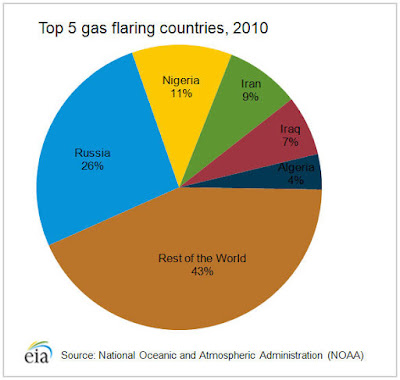fig.1 source: Integritynigeria.org
Gas flaring is the burning of natural gas that is connected with crude oil when it pumped out of the ground. Gas flaring is the solitary and most common source of global warming and contributes to emissions of carbon monoxide, nitrogen dioxide and methane which have the propensity of causing environmental pollution and ecological disturbances or destruction (Ubani, E, and Onyejekwe I 2013). Nigeria, the 11th biggest oil producer on the planet, is invested with a greater number of gas stores than oil. By and by, Nigeria has the shame of being the world's most noteworthy in flaring of the gas related with petroleum creation and aside from being wastage of significant assets, this practice runs in opposition to Nigeria's commitments to reduce greenhouse gas (GHG) emissions under,inter alias, the 1992 United Nations Framework Convention on Climate Change and the 1997Kyoto Protocol .( Malumfashi, G, 2007). Figure 2 and 3 below shows Nigeria flared natural gases from year 2001-2011 and Nigeria compared to other flaring countries respectively.
fig. 2. source: Lokoja.wordpress.comGas flaring have been censured severally in diverse nations of the world, in spite of the fact that the practice is still reachable in a few nations with numerous people requiring a stop. According to Ajugwo, A,(2013) Gas flaring have impoverished the communities where it is practiced, with attendant environmental, economic and health challenges. Hesitance with respect to government and strategy producers is additionally a component, this challenges confronted by neighborhood groups from gas flares are a sufficient justification for ending gas flaring practice,( Ajugwo, A 2013).
fig. 3
Drilling mud and oil now and again discover their way into the streams, surface waters and arrive consequently making them unfit for utilization nor liveable by man or creature. The monetary and ecological consequences of this abnormal state of gas flaring are serious because of the fact that this procedure is a noteworthy misuse of potential fuel which is at the same time contaminating water, air, and soil in the Niger Delta area of Nigeria.
In places where burning off gas occurs in a relatively concentrated area, such as Niger Delta, the average life expectancy is 43 years, and the infant mortality rate in the delta is the highest in Nigeria -12% of babies die during their first year ( Ben, S 2010). The implication of gas flaring on human health are all related to the exposure of those hazardous air pollutant emitted during incomplete combustion of gas flare. These pollutants are associated with variety of adverse health impacts, including cancer, neurological, reproductive and developmental effects (Ajugwo, A, 2013). Deformities in children, lungs damage and skin problem have also been reported.
Corrosive downpours(Acid rain) have been connected to the exercise of gas flaring. Layered rooftops in the Niger Delta area of Nigeria have been corroded by the composition of rain that falls as a result of flaring. Acid rain ferments lakes and streams and harms vegetation, it also accelerate the decay of building materials and paints and contributes to visibility degradation (Ajugwo A. 2013).
Whatever the purposes behind flaring the gas, the truth remains that it is wastage of important assets greatly required for monetary improvement; that the flaring/venting amid oil creation operations discharge greenhouse gases add to worldwide temperature alternation bringing about environmental change, and this invalidates Nigeria's duties under the UNFCC and Kyoto Protocol; and that it influences the natural quality and soundness of the Niger Delta group, the region of the flares. Henceforth, gas flaring must be wiped out, sooner than later.
Reference
Ajugwo, A.O., 2013. Negative Effects of Gas Flaring: The Nigerian Experience. Journal of Environment Pollution and Human Health,1(1),p6-8.
Ben, S.. (2010). Up In The Smoke. Process Focus. 23 (2), p31-32.
Malumfashi, G.I., 2007. Phase-out of gas flaring in Nigeria by 2008. The Prospects of a multi-win project, Petroleum training journal,1(1), p1-5
Ubani, E.C. and Onyejekwe, I.M., 2013. Environmental impact analysis of gas flaring in the Niger delta region of Nigeria. American J. of Scientific and Industrial Research, 4(2), pp.246-252.
Whatever the purposes behind flaring the gas, the truth remains that it is wastage of important assets greatly required for monetary improvement; that the flaring/venting amid oil creation operations discharge greenhouse gases add to worldwide temperature alternation bringing about environmental change, and this invalidates Nigeria's duties under the UNFCC and Kyoto Protocol; and that it influences the natural quality and soundness of the Niger Delta group, the region of the flares. Henceforth, gas flaring must be wiped out, sooner than later.
Reference
Ajugwo, A.O., 2013. Negative Effects of Gas Flaring: The Nigerian Experience. Journal of Environment Pollution and Human Health,1(1),p6-8.
Ben, S.. (2010). Up In The Smoke. Process Focus. 23 (2), p31-32.
Malumfashi, G.I., 2007. Phase-out of gas flaring in Nigeria by 2008. The Prospects of a multi-win project, Petroleum training journal,1(1), p1-5
Ubani, E.C. and Onyejekwe, I.M., 2013. Environmental impact analysis of gas flaring in the Niger delta region of Nigeria. American J. of Scientific and Industrial Research, 4(2), pp.246-252.



No comments:
Post a Comment